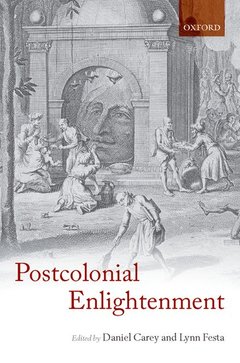Description
The Postcolonial Enlightenment
Eighteenth-Century Colonialism and Postcolonial Theory
Coordinators: Carey Daniel, Festa Lynn
Language: English
Publication date: 02-2009
394 p. · 16.3x24.1 cm · Hardback
394 p. · 16.3x24.1 cm · Hardback
Description
/li>Contents
/li>Biography
/li>
Over the last thirty years, postcolonial critiques of European imperial practices have transformed our understanding of colonial ideology, resistance, and cultural contact. The Enlightenment has played a complex but often unacknowledged role in this discussion, alternately reviled and venerated as the harbinger of colonial dominion and avatar of liberation, as target and shield, as shadow and light. This volume brings together two arenas - eighteenth-century studies and postcolonial theory - in order to interrogate the role and reputation of Enlightenment in the context of early European colonial ambitions and postcolonial interrogations of Western imperial aspirations. With essays by leading scholars in the field, Postcolonial Enlightenment address issues central not only to literature and philosophy but also to natural history, religion, law, and the emerging sciences of man. The contributors situate a range of writers - from Hobbes and Herder, Behn and Burke, to Defoe and Diderot - in relation both to eighteenth-century colonial practices and to key concepts within current postcolonial theory concerning race, globalization, human rights, sovereignty, and national and personal identity. By enlarging the temporal and geographic framework through which we read, the essays in this volume open up alternate genealogies for categories, events and ideas central to the emergence of global modernity.
Some Answers to the Question: 'What is Postcolonial Enlightenment?'. Part One: Subjects and Sovereignty. 1. Hobbes and America. 2. The Physiological Sublime: Pleasure and Pain in the Colonial Context. Part Two: Enlightenment Categories and Postcolonial Classifications. 3. Reading Contrapuntally: ligRobinson Crusoel/ig, Slavery, and Postcolonial Theory. 4. Between 'Oriental' and 'Blacks, So Called,' 1688-1788. 5. Orientalism and the Permanent Fix of War. Part Three: Nation, Colony, and Enlightenment Universality. 6. Of Speaking Natives and Hybrid Philosophers: The French Enlightenment Critique of Colonialism. 7. Universalism, Diversity, and the Postcolonial Enlightenment. 8. 'These Nations Newton Made his Own': Poetry, Knowledge and British Imperial Globalisation. Coda: How to Write Postcolonial Histories of Empire?.
Daniel Carey is the author of Locke, Shaftesbury, and Hutcheson: Contesting Diversity in the Enlightenment and Beyond (Cambridge, 2006), and editor of Asian Travel in the Renaissance (Blackwell, 2004) and Les voyages de Gulliver: mondes lointains ou mondes proches (Presses universitaires de Caen, 2002). He is senior lecturer in English at the National University of Ireland, Galway. Lynn Festa is the author of Sentimental Figures of Empire in Eighteenth-Century Britain and France (Johns Hopkins, 2006). She has taught at Harvard University, the University of Wisconsin, Madison, and is currently associate professor of English at Rutgers University.
© 2024 LAVOISIER S.A.S.




